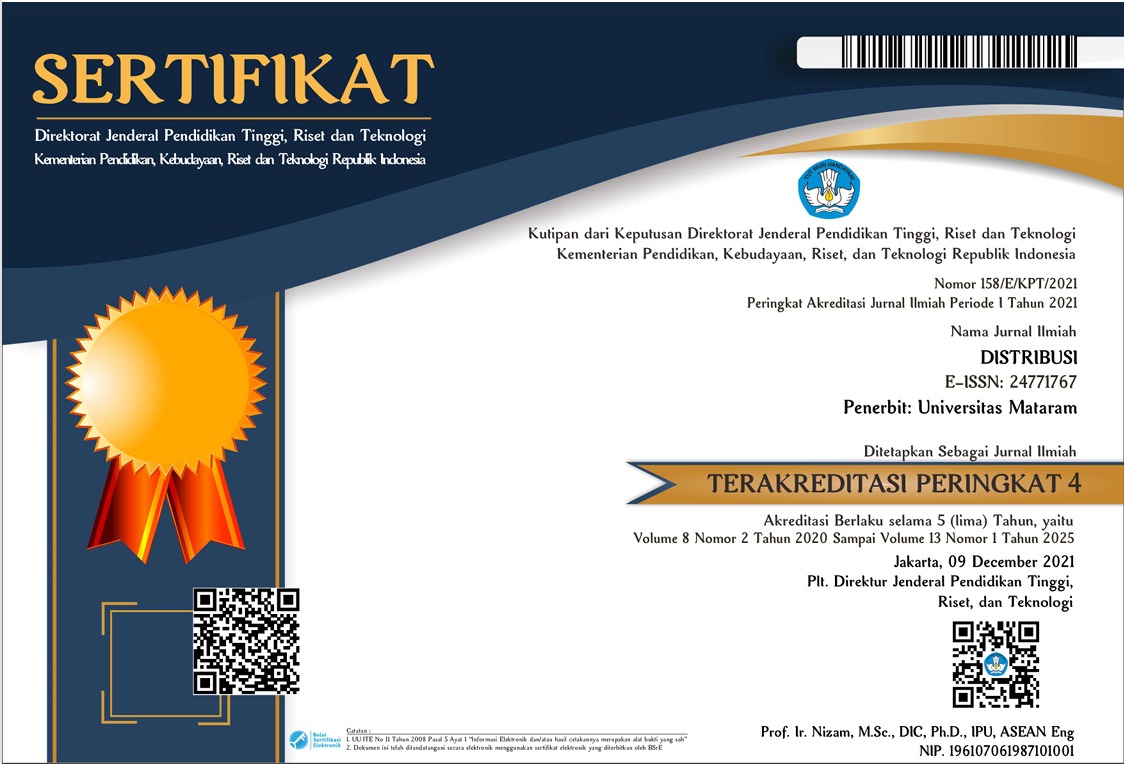ANALISIS PENGGUNAAN FASILITAS TARIK TUNAI SALDO GOPAY MELALUI ATM XXX DENGAN MEKANISME TARIK TUNAI TANPA KARTU DI JAKARTA
DOI:
https://doi.org/10.29303/distribusi.v9i2.171Keywords:
Consumer Behavior, Financial Technology , Information TechnologyAbstract
The bank is a financial service provider whose primary choice is for the community's financial-related needs. However, with increased mobility and the people's need for ease financial transactions, various technology-based innovations have emerged to safely, comfortably, and quickly fulfill community activities. One of the methods of financial service that has become the choice of Indonesians is finance technology (fintech). Fintech is a merger of the financial system various aspects of financial services. Go-Pay is a fintech in Indonesia that is a mobile payment service on the Go-Jek platform. Go-Pay provides to provide convenience and comfort for the transaction process carried out in Go-Jek. For banks not to be less competitive with Fintech, there is a need for adjustments and cooperation to strengthen business potential. PT. XXX (XXX) collaborates with Go-Pay in the Go-Pay cash withdrawal mechanism through XXX ATMs with the Cardless Cash Withdrawal mechanism as a form of banking synergy with fintech to facilitate transactions for Indonesians. This study purposes to determining how much the level of use of these facilities, especially in the community in Jakarta
Downloads
References
Allen, F; Mcandrews, J; and P. Strahan. (2002). E-Finance: An Introduction. Journal of Financial Services Research, 22:1/2 5-27.
Carney, M. (2016). Enabling the Fintech Transformation: Revolution, Restoration, or Reformation. BoE Speech.
DeYoung, R. (2001). The Financial Performance of Pure Play Internet Banks. Economic Perspectives. Vol. 25(1):60-75.
DeYoung, R. (2001). The Financial Progress of Pure Play Internet Banks. BIS paper no 7
Fadila and D. Ridho. (2013). Perilaku Konsumen. Palembang: Citrabooks
Fitriana & Soetjipto, B. E. (2015). The Analysis of Factors Affecting Customer Loyalty at McDonald. IJABER 13(9), 6853-6871
Hajjat, M. M. & Hajjat, F. (2014). The Effect of Product Quality on Business Performance in Some
Arab Companies. Journal of Emerging Trends in Economics and Management Sciences 5(5), 498508.
Hudson and Evans. (2005). The Journal of Economic and Social Policy. Vol.10, Article 3
J. Peter. (2014). Consumer Behavior and Marketing Strategy. Jakarta: Salemba Empat,
Meifang, Y., He, D., & Zheng Xianrong, X. X. (2018). Impact of Payment Technology Innovations on the Traditional Financial Industry: A Focus on China. Journal of Technological Forecasting and Social Change, 199-2017.
Malhotra, P. and Singh. (2009). The Impact of Internet Banking on Bank Performance and Risk: The Indian Experience” Eurasian Journal of Business and Economics. Vol 2 (4): 43-62.
Mardiyanto, Handono. (2009). Intisari Manajemen Keuangan. Jakarta. Grasindo Onay, Ceylan; Ozsoz, Emrr; Helvacioglu, Ash Debiz. (2008). The Impact of Internet Banking on Banks Profitability - The Case of Turkey”. Oxford Business and Economics Program.
P. Kotler and K. L. Keller. (2015). Marketing Management. Harlow: Pearson Education
P. Ristiyanti. (2004). Perilaku Konsumen. Yogyakarta: Andi Offset.
Santoso, Sugeng (2020). Optimizing Access to Financial Capital of Creative Economy for Startups Towards Global Competitiveness, BECOSS (Business Economic, Communication, and Social Sciences), 2(2), 13-21. DOI: https://doi.org/10.21512/becossjournal.v2i2.6246.
Santoso, S.; Nurzaki, A.; Santoso, A.; Benawan, C.; Wahyudin, D. (2020). Kinerja PT. PLN Unit Induk Distribusi Jakarta Raya Dengan Supply Chain Operation Reference, Jurnal Distribusi, 8(2), 255-266. DOI: 10.29303/ distribusi.v8i2.136.
Santoso, S.; Natanael, A.; Fatmawati, A.A.; Griselda, A.; Khoirunnisa, J.; Simanjuntak, M.; Bagus, A. A. R. (2021). Analisis Pengembangan Platform Ekspor Sub Sektor Kuliner Tinjauan Dari Model Sistem Inovasi, Jurnal Distribusi, 9(1), 29-38. DOI: 10.29303/distribusi.v9i1.151.
Alika, V. A.; Santoso, S.; Nurmaliki, S.; Anisa, N. (2021). Marketing Strategy Sharia Financial Institutions to Promote Sharia Fintech and Micro and Small Enterprises (MSES). Proceedings of the 1st MICOSS Mercu Buana International Conference on Social Sciences, MICOSS 2020, EAI. doi:10.4108/eai.28-9-2020.2307373.
Rahma Septi Anzelina, Sugeng Santoso, Luthfi Aulia Safari, Dimas Iskandar, Fery Erwanda. (2021). Pembiayaan Dan Manfaat Financial Technology (Fintech) Syariah Pada 212 Mart, Syi’ar Iqtishadi: Journal of Islamic Economics, Finance and Banking, 5(1), 68-92. DOI: http://dx.doi.org/10.35448/jiec.v5i1.9889.
Putro, S, S; Santoso, S. (2021). Desain Konseptual Digitalisasi Manajemen Mutu Pada Industri FMCG, Jurnal Mix: Jurnal Ilmiah Manajemen, 11(2), 147-162. DOI:10.22441/mix.2021.v11i2.001.
KH Solaiman; Redata, L.; Kezia, R.; Santoso, S. (2021). Analisis Korelasi Pendampingan Komunitas Terhadap Inovasi Pelaku Ekonomi Kreatif Dan Pemenuhan Kebutuhan Konsumen: Studi Kasus Pada Komunitas Tangerang Berdaya Dan Pelaku Ekonomi Kreatif Kuliner Tangerang. Business Management Journal, 17(1), 1-19. doi:10.30813/bmj.
Yuliana, Vinsia dan Santoso, Sugeng (2021). Re-engineering and Technology Development on Reference Sample of Business Process (Case Study on Health Laboratory Service Company). Jurnal Ilmiah Manajemen dan Bisnis, 7(2). Page 212-222.
Downloads
Published
How to Cite
Issue
Section
License
Copyright (c) 2021 Even Sitompul, Sugeng Santoso

This work is licensed under a Creative Commons Attribution-ShareAlike 4.0 International License.
Penulis yang naskahnya diterbitkan menyetujui ketentuan sebagai berikut:
- Hak publikasi atas semua materi naskah jurnal yang diterbitkan/dipublikasikan dalam situs Jurnal DISTRIBUSI ini dipegang oleh dewan redaksi dengan sepengetahuan penulis (hak moral tetap milik penulis naskah).
- Ketentuan legal formal untuk akses artikel digital jurnal elektronik ini tunduk pada ketentuan lisensi Creative Commons Attribution-ShareAlike (CC BY-SA), yang berarti Jurnal DISTRIBUSI berhak menyimpan, mengalih media/format-kan, mengelola dalam bentuk pangkalan data (database), merawat, dan mempublikasikan artikel tanpa meminta izin dari Penulis selama tetap mencantumkan nama Penulis sebagai pemilik Hak Cipta.
- Naskah yang diterbitkan/dipublikasikan secara cetak dan elektronik bersifat open access untuk tujuan pendidikan, penelitian, dan perpustakaan. Selain tujuan tersebut, dewan redaksi tidak bertanggung jawab atas pelanggaran terhadap hukum hak cipta.









